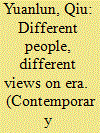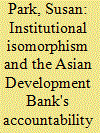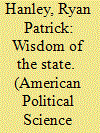| Srl | Item |
| 1 |
ID:
094085


|
|
|
| 2 |
ID:
069849


|
|
|
| 3 |
ID:
131888


|
|
|
|
|
| Publication |
2014.
|
| Summary/Abstract |
In the 1990s Multilateral Development Banks created accountability mechanisms (AMs) that allowed people affected by development projects redress. Currently undertheorized, this paper examines how and why the Asian Development Bank (ADB) created an AM, and whether the AM serves its purpose to hold the ADB to account and to provide 'fair hearing of the views of the affected group'. This article argues that the ADB created a new AM because of institutional isomorphism, borrowing the idea of the AM from the World Bank as a result of coercive and mimetic isomorphic processes. Further, that the ADB introduced a mechanism ill-suited to the pre-existing (old) organizational culture of the ADB, which is based on consensus and hierarchical rule-following in the context of ADB operations to further economic growth while upholding state sovereignty. Despite its restructure and recent review, the mechanism's weakness was revealed through a stand-off between China and the AM over an investigation begun in 2009 (creating something 'blue'). The paper concludes that the AM's ability to serve its purpose will remain hampered as long as ADB maintains consensus around economic growth and state sovereignty over providing recourse to affected people.
|
|
|
|
|
|
|
|
|
|
|
|
|
|
|
|
| 4 |
ID:
141501


|
|
|
|
|
| Summary/Abstract |
Inclusive institutions make correct policy choices required for steady catch-up growth more likely. India started out with highly inclusive political institutions since it adopted democracy with universal suffrage at independence. But extractive economic institutions, inherited from the British, were made more so by economic controls. In addition, a heterogeneous electorate allowed politicians to cultivate vote-banks and populist schemes instead of delivering better public services and governance. India’s opening out was adequately nuanced and flexible but was sometimes used as a substitute for harder domestic reforms. It, however, added to the growing constituencies that benefit from growth, and are pushing for more inclusive productivity enabling economic institutions. Broader interest groups create better institutions and incentives. Examples from general governance, the regulation of industry, and agricultural marketing show the process, although messy and prolonged, is in the right direction.
|
|
|
|
|
|
|
|
|
|
|
|
|
|
|
|
| 5 |
ID:
133028


|
|
|
|
|
| Publication |
2014.
|
| Summary/Abstract |
Adam Smith's engagement with China and Tartary is a central yet underappreciated element of his economic and political thought. This article reconstructs this engagement and demonstrates its broader significance, arguing that it focuses on three themes: the economic institutions that promote domestic growth in a manner that alleviates the material conditions of the poorest, the social and political conditions that minimize the dependence of the poor on the wealthy, and the ethical values and civic institutions that guarantee the existential survival of the state. This treatment is significant for three reasons: It offers useful insight into the contested issue of Smith's conception of legitimate state action; it clarifies Smith's vision of a commercial order that promotes human dignity; and it reveals the depth of his participation in a specific contextual debate.
|
|
|
|
|
|
|
|
|
|
|
|
|
|
|
|